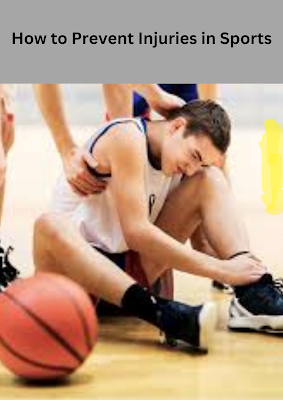How to Prevent Injuries in Sports: A Comprehensive Guide
Introduction
Sports are an excellent way to stay fit, have fun, and challenge ourselves physically and mentally. However, injuries can be a significant setback for athletes of all levels. Whether you're a professional athlete or someone who enjoys recreational sports, it's crucial to take preventive measures to minimize the risk of injuries. In this comprehensive guide, we will explore various strategies and techniques to help you prevent injuries in sports, ensuring a safe and enjoyable experience.
How to Prevent Injuries in Sports
Sports injuries can occur due to various factors, including improper training techniques, lack of warm-up exercises, overuse of muscles, inadequate equipment, and poor field conditions. By adopting the following preventive measures, you can significantly reduce the likelihood of getting injured while participating in sports:
1. Warm-up before every session
A proper warm-up is essential to prepare your body for physical activity. Spend at least 10-15 minutes engaging in dynamic stretching exercises that target the major muscle groups. This will increase blood flow, warm up your muscles, and improve your flexibility, reducing the risk of muscle strains and sprains.
2. Use appropriate protective gear
Wearing the right protective gear is crucial in preventing injuries. Depending on the sport, this may include helmets, mouthguards, knee pads, shin guards, or protective eyewear. Make sure the gear fits properly and is in good condition to provide optimal protection.
3. Maintain proper technique and form
Using the correct technique and form while playing sports is vital for injury prevention. Improper movements and biomechanics can put excessive strain on your muscles and joints, leading to injuries. Seek guidance from a coach or trainer to ensure you're using the correct technique for your chosen sport.
4. Gradually increase intensity and duration
Avoid pushing yourself too hard too quickly. Gradually increase the intensity and duration of your training sessions to allow your body to adapt and build strength over time. Sudden spikes in activity levels can strain your muscles and increase the risk of injuries.
5. Stay hydrated
Proper hydration is often overlooked but is essential for optimal performance and injury prevention. Dehydration can lead to muscle cramps, fatigue, and reduced coordination. Drink plenty of water before, during, and after your sports activities to maintain proper hydration levels.
6. Incorporate strength and conditioning exercises
Engaging in regular strength and conditioning exercises can help build strong muscles and improve stability. Strong muscles provide better support for your joints and help absorb the impact of physical activities, reducing the risk of injuries. Include exercises that target all major muscle groups in your training routine.
7. Listen to your body
Pay attention to any signs of pain, discomfort, or fatigue during your sports activities. Pushing through pain can exacerbate injuries and lead to more severe damage. If you experience persistent pain or discomfort, take a break and consult a healthcare professional to avoid further complications.
8. Maintain a balanced diet
A well-balanced diet plays a vital role in supporting your body's overall health and recovery. Ensure you're consuming a variety of nutrient-dense foods, including lean proteins, fruits, vegetables, whole grains, and healthy fats. Proper nutrition will provide your body with the necessary fuel and nutrients for optimal performance and injury prevention.
9. Rest and recover
Allowing your body enough time to rest and recover is crucial for injury prevention. Schedule regular rest days in your training program and ensure you're getting enough sleep each night. Rest and recovery give your muscles and tissues time to repair and strengthen, reducing the risk of overuse injuries.
10. Be aware of your surroundings
Whether you're playing indoors or outdoors, being aware of your surroundings is essential. Ensure the playing area is free of hazards, such as uneven surfaces, debris, or obstacles. Additionally, be mindful of other players to avoid collisions and accidental injuries.
FAQs (Frequently Asked Questions)
FAQ 1: Can stretching help prevent sports injuries?
Yes, stretching plays a vital role in injury prevention. Dynamic stretching before physical activity helps warm up the muscles, increase flexibility, and improve range of motion, reducing the risk of strains and sprains. Static stretching after exercise helps cool down the body and promotes muscle recovery.
FAQ 2: What is the importance of a proper warm-up?
A proper warm-up is essential for preparing your body for physical activity. It increases blood flow, raises body temperature, and loosens up muscles, tendons, and ligaments. A warm-up reduces the risk of muscle strains, improves performance, and enhances overall athletic ability.
FAQ 3: Is it necessary to consult a healthcare professional before starting a sports activity?
While it may not be necessary for recreational activities, it's always a good idea to consult a healthcare professional if you have any underlying medical conditions or concerns. They can assess your fitness level, provide personalized advice, and recommend appropriate modifications or precautions to prevent injuries.
FAQ 4: Should I use ice or heat for treating sports injuries?
In general, ice is recommended for acute injuries, such as sprains or strains, as it helps reduce inflammation and swelling. Heat therapy is beneficial for chronic injuries or muscle stiffness, as it promotes blood circulation and relaxation. However, it's best to consult a healthcare professional for specific recommendations based on your injury.
FAQ 5: Can overtraining increase the risk of injuries?
Yes, overtraining can significantly increase the risk of injuries. Pushing your body beyond its limits without adequate rest and recovery time can lead to physical and mental fatigue, decreased performance, and increased susceptibility to injuries. It's crucial to listen to your body and incorporate proper rest days into your training routine.
FAQ 6: Are there any specific exercises to prevent common sports injuries?
Yes, there are several exercises that can help prevent common sports injuries. These may include exercises that target strengthening the core, improving balance and stability, enhancing flexibility, and building strength in the muscles most commonly used in your chosen sport. A qualified trainer or physical therapist can guide you in selecting the appropriate exercises for your needs.



.png)
.png)
.png)





No comments:
Post a Comment